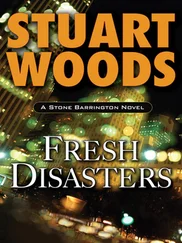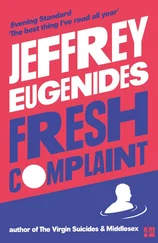rlfj - A Fresh Start
Здесь есть возможность читать онлайн «rlfj - A Fresh Start» весь текст электронной книги совершенно бесплатно (целиком полную версию без сокращений). В некоторых случаях можно слушать аудио, скачать через торрент в формате fb2 и присутствует краткое содержание. Жанр: Эротические любовные романы, на английском языке. Описание произведения, (предисловие) а так же отзывы посетителей доступны на портале библиотеки ЛибКат.
- Название:A Fresh Start
- Автор:
- Жанр:
- Год:неизвестен
- ISBN:нет данных
- Рейтинг книги:4.33 / 5. Голосов: 3
-
Избранное:Добавить в избранное
- Отзывы:
-
Ваша оценка:
- 80
- 1
- 2
- 3
- 4
- 5
A Fresh Start: краткое содержание, описание и аннотация
Предлагаем к чтению аннотацию, описание, краткое содержание или предисловие (зависит от того, что написал сам автор книги «A Fresh Start»). Если вы не нашли необходимую информацию о книге — напишите в комментариях, мы постараемся отыскать её.
A Fresh Start — читать онлайн бесплатно полную книгу (весь текст) целиком
Ниже представлен текст книги, разбитый по страницам. Система сохранения места последней прочитанной страницы, позволяет с удобством читать онлайн бесплатно книгу «A Fresh Start», без необходимости каждый раз заново искать на чём Вы остановились. Поставьте закладку, и сможете в любой момент перейти на страницу, на которой закончили чтение.
Интервал:
Закладка:
Me: "I think Jeb will do the right thing, too. I feel comfortable with John's choice."
Tom: "Who do you think did a good job when, as you say, they landed in the jackpot?"
Me: "Well, Teddy Roosevelt is one of my favorites. He was excellent. The same goes for Harry Truman, and Jerry Ford was very underrated at the time."
Tom: "And the others? Who didn't work out?"
Me: "These are just my opinions, but Andrew Johnson was nothing but a political hack chosen by Lincoln to try and hold the country together prior to the Civil War. When Lincoln was assassinated, Johnson was a Democrat surrounded by Republicans, and he was just chum in front of the sharks. Tyler and Fillmore didn't work out either. I think the most tragic was Lyndon Johnson. He had great domestic plans, but was completely incapable of handling anything overseas."
Tom: "Where do you think you rate on that scale?"
Me: (Shrugging.) "That won't be for me to say. I hope on the plus side, but I just don't know."
Tom: "What will the historians say in twenty years?"
Me: (Smiling.) "That will be the least of my problems. Strokes and Alzheimer's run in my family. Twenty years from now I won't even know my name."
That was a real stumper for Brokaw. He simply didn't know how to respond to that, and you could see it in his face. He decided to focus on the overall changes during the past seven years.
Tom: "When you took office the nation was under attack by parties unknown, thousands of Americans were dead, and President Bush was missing in action. On the domestic side, more than a few economists were concerned about future runaway deficits and a recession, if not worse. Today America is the undisputed superpower of the world, and you have managed a net surplus during your seven year administration. Inflation is low and unemployment is low. This is an enviable record for any world leader."
Me: "I think it's a matter of knowing what needed to be done, and what didn't need to be done. When I was sworn in, we had a pretty good idea what was actually happening. The problem was that there were an awful lot of entrenched interests with their own agendas. I came in with only one agenda, which was to keep the nation safe and strong."
Tom: "What were those entrenched interests?"
Me: "Let me preface this by saying that many of the people involved were acting out of what they honestly felt was the best interest of the country. However, when you total them up, the plans they had would have weakened us, not strengthened us. Defense contractors wanted to sell the Pentagon all their newest goodies, which would have been good for their shareholders, but not necessarily good for the economy as a whole. Congress wanted to use those toys, and a lot of conservatives believed that military action could be used for more than simply defending the country, but could also be used to help build more democratic societies in the countries which threatened us. I disagreed."
Tom: "How so?"
Me: "My belief was that we needed to take a very hard and realistic look at the rest of the world. We weren't going to get pluralistic and liberal democracies in nations with rampant unemployment, illiteracy, religious intolerance, and sectarian violence. American has an excellent military, but you use armies and navies to kill people and break things, not to build countries. We needed to play to our strengths, not our weaknesses."
Tom: "And those strengths were?"
Me: "That plays into our economic strengths. You can't have a strong defense without a strong economy. That means not buying every weapon ever designed, but investing in America. We needed to invest in our real strength, our human capital and our economic capital."
Tom: "Could you be more specific?"
Me: "President Bush's DREAM Act was a perfect example of strengthening our human capital, by fixing parts of our immigration system. His No Child Left Behind Act did the same for education reform. Infrastructure is an example of strengthening our economic capital. For the cost of an invisible bomber, we can buy several very visible repaired bridges and canal locks and sewer systems. Ultimately all of this will make us much stronger than any of our potential foes."
We broke for a few minutes for a bathroom break but then resumed, only this time on my 'philosophy' of governing.
Tom: "What do you think is the most important thing for a President to do?"
Me: "Learn to say NO, and say it over and over. And not just to the other party, either. It's even more important to say it to your own party, and louder and more often."
Tom: "What do you mean?"
Me: "Well, saying no to the other party is easy. After all, as a Republican it's pretty easy to say no to raising spending and creating new programs and agencies that the Democrats want. What's much more difficult is to say no when the Republican Party is demanding that you cut taxes or go to war someplace or do something else that will totally screw things up for the country. No, no, no! Just say it over and over."
Tom: "Which is more dangerous, the economy or foreign relations? Where do you say no more often?"
Me: "In the short run, foreign relations, but in the long run, the economy. With foreign relations, we have the most powerful military in the world, bar none, and everybody wants us to use it. The Republicans wanted to invade Afghanistan - No. Iraq - No. Iran - No. North Korea - No. Venezuela - No. The Democrats wanted to send the same army everywhere else, to get into the middle of civil wars and make everybody on the planet behave and be nice. No! You only use the military when you have to, not when you want to."
Tom: "And the economy?"
Me: "Again, the magic word is No. No, I am not going to raise Social Security and Medicare and food stamps and everything else under the sun. No, I am not going to cut taxes and borrow money from the Chinese. Deficits matter. You can go in the hole on occasion, but you have to pay it back. It's the same whether you are an individual, a family, or a nation. If you don't pay the bills, the economy gets weaker and weaker and weaker, and then, very suddenly, you're not a great nation anymore. So you just keep saying no, over and over."
Tom: "That doesn't make many friends. They could say that you are breaking campaign promises."
Me: "Campaign promises are made by people who don't have the responsibility of being the President. The job looks different when you aren't kibitzing from the cheap seats."
Tom: "Does Vice President McCain plan to continue the Buckman Doctrine?"
Me: "We never really had any specific 'Buckman Doctrine.' We always handled foreign relations problems on an issue by issue basis, and Vice President McCain was fully involved in any discussions."
Tom: "You may not have had a formal doctrine specified, but certainly there quickly came to be an understanding that any nation that militarily attacked American interests was going to be the recipient of a fearsome retribution. You effectively destroyed both the governments and the nations of Afghanistan and Iraq."
Me: "If you are going to play in the big leagues, don't be surprised by big league rules. If you attack America, or you attack our allies, nations we have formally promised to protect, don't be surprised when we return the favor. How we do that, that is up to the President and his advisers, but the fact that there will be a response should be understood."
Tom: "There have been persistent calls by both the left and the right to use military force to clean up the world, to topple dictators and act as a policeman. You have steadfastly refused to even discuss those topics."
Me: "It is not in America's interest to throw our weight around like a bull in a china shop. If people think that we can make the rest of the planet act nice and play well with the other children, they are astonishingly naïve. As for dictators, sooner or later their own citizens will figure out what to do and take care of the problem. If we get involved, nobody will benefit, least of all us. I've said it before; we can't be in the business of running around and shooting jackasses just because they are jackasses. We'll run out of bullets long before we run out of jackasses. Again, this is just one more example of the need to say no."
Читать дальшеИнтервал:
Закладка:
Похожие книги на «A Fresh Start»
Представляем Вашему вниманию похожие книги на «A Fresh Start» списком для выбора. Мы отобрали схожую по названию и смыслу литературу в надежде предоставить читателям больше вариантов отыскать новые, интересные, ещё непрочитанные произведения.
Обсуждение, отзывы о книге «A Fresh Start» и просто собственные мнения читателей. Оставьте ваши комментарии, напишите, что Вы думаете о произведении, его смысле или главных героях. Укажите что конкретно понравилось, а что нет, и почему Вы так считаете.











